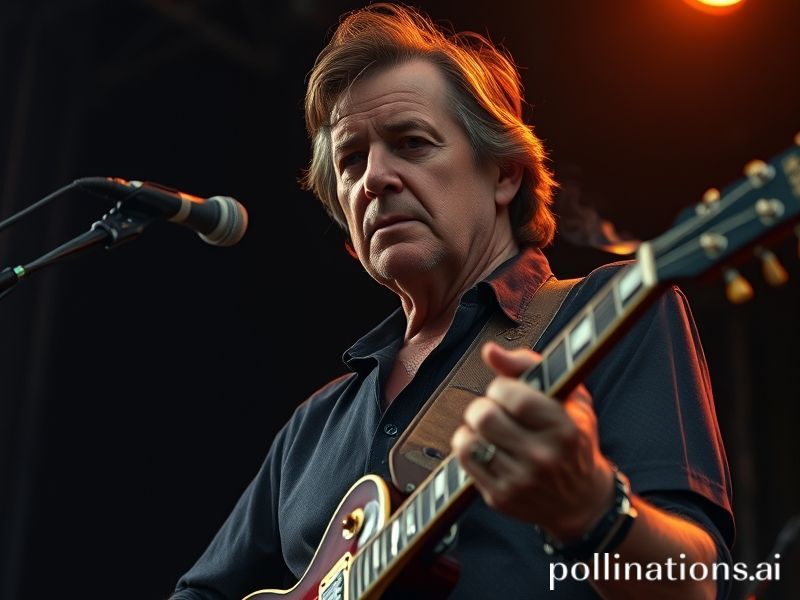From Saigon to Spotify: How John Fogerty Became the Planet’s Favorite Protest Muzak
Fogerty’s Creedence: The Last American Soundtrack Playing in a Planet-Wide Waiting Room
By “Globetrotting” Gustave Serrano, filed from an airport lounge whose PA system still thinks “Proud Mary” is a boarding call
Somewhere between the duty-free tequila and the vinyl reissue stand at Heathrow’s Terminal 5, John Fogerty’s nasal rasp leaks out like contraband nostalgia. A security guard humming “Fortunate Son” while confiscating nail clippers is the kind of irony the songwriter would appreciate—Vietnam’s sonic protest now pacified into elevator ambience for global capitalism. Yet this is precisely why Fogerty still matters: his catalogue has become the lingua franca of disillusionment, translated into 47 Spotify markets and quoted by everyone from Manila jeepney drivers to French gilets jaunes convinced the swamp they’re fighting was dredged in Washington.
The metrics are almost comically universal. Last month in Lagos, a ride-share app advertised its “Creedence Clearwater Revival Chill” playlist; downloads spiked 18%. In Seoul, BTS’s Jungkook cited “Bad Moon Rising” as the track that taught him English swearing etiquette. Meanwhile, Berlin’s refugee-run radio station uses “Who’ll Stop the Rain” as bumper music during climate-segment weather reports—proof that human misery, like rain, falls on the just and unjust alike, preferably with a syncopated backbeat.
Fogerty never set out to be the UN’s unofficial troubadour. In 1969 he was a 24-year-old draft-dodger’s id, screaming at napalm from a San Francisco studio. Today, that same voice is piped into Jakarta co-working spaces as “focus-friendly classic rock.” The historical whiplash is enough to give a Marxist whiplash: protest songs commodified into productivity soundtracks, the revolution sold back to us in lossless FLAC. Still, the lyrics cut through. When a Bolivian protester live-streamed herself singing “Run Through the Jungle” while evading tear gas, the clip trended worldwide for 36 hours—until TikTok muted it for copyright infringement. Even rebellion has a royalty rate.
The global elite, ever tone-deaf, can’t resist appropriating Fogerty’s ire. At last year’s COP28 in Dubai, a delegate from an oil-rich micro-kingdom reportedly chose “Green River” as his walk-on music, presumably because “green” sounded thematic. The gods of irony clutched their pearls; Fogerty, now 78, responded with a terse tweet: “That river’s still on fire, pal.” In an era when sincerity is algorithmically optimized, Fogerty’s gruff refusal to license his songs for pickup-truck ads feels downright revolutionary—like finding a bartender who still waters his drinks with actual tears.
Economists have noticed. Streaming revenue from emerging markets now accounts for 42% of Fogerty’s annual take, a figure that neatly inverts the old colonial model: instead of shipping raw rubber out of the Amazon, we ship raw angst in. Cultural-studies professors call it “soft-power feedback loops”; musicians just call it rent. Either way, it’s enough to keep Fogerty on perpetual tour, playing to arenas where half the crowd learned English from his consonants. During a recent encore in Buenos Aires, he asked, “Anybody here actually own a swamp?” The roar suggested most of the audience felt they were standing in one.
Which brings us to the broader significance. In a world busy weaponizing every heritage site and hashtag, Fogerty’s catalogue remains an oddly neutral zone—a sonic Switzerland where oligarchs and anarchists alike can agree the drums are mixed perfectly. The songs carry enough American DNA to remind everyone who dropped the first bomb, yet they’re melodic enough to whistle while you pick up the pieces. Call it the last shared text before the culture wars Balkanize us into algorithmic subspecies.
So next time you hear “Have You Ever Seen the Rain?” echoing through a Nairobi shopping mall or a Reykjavik Uber, remember: that’s not just nostalgia. It’s a time-stamped dispatch from an empire busy auctioning off its own regrets. And if the chorus still gives you goosebumps, congratulations—you’ve been drafted into the only army left, the one that marches on irony alone. Just don’t expect hazard pay; Fogerty spent his already on legal fees.







